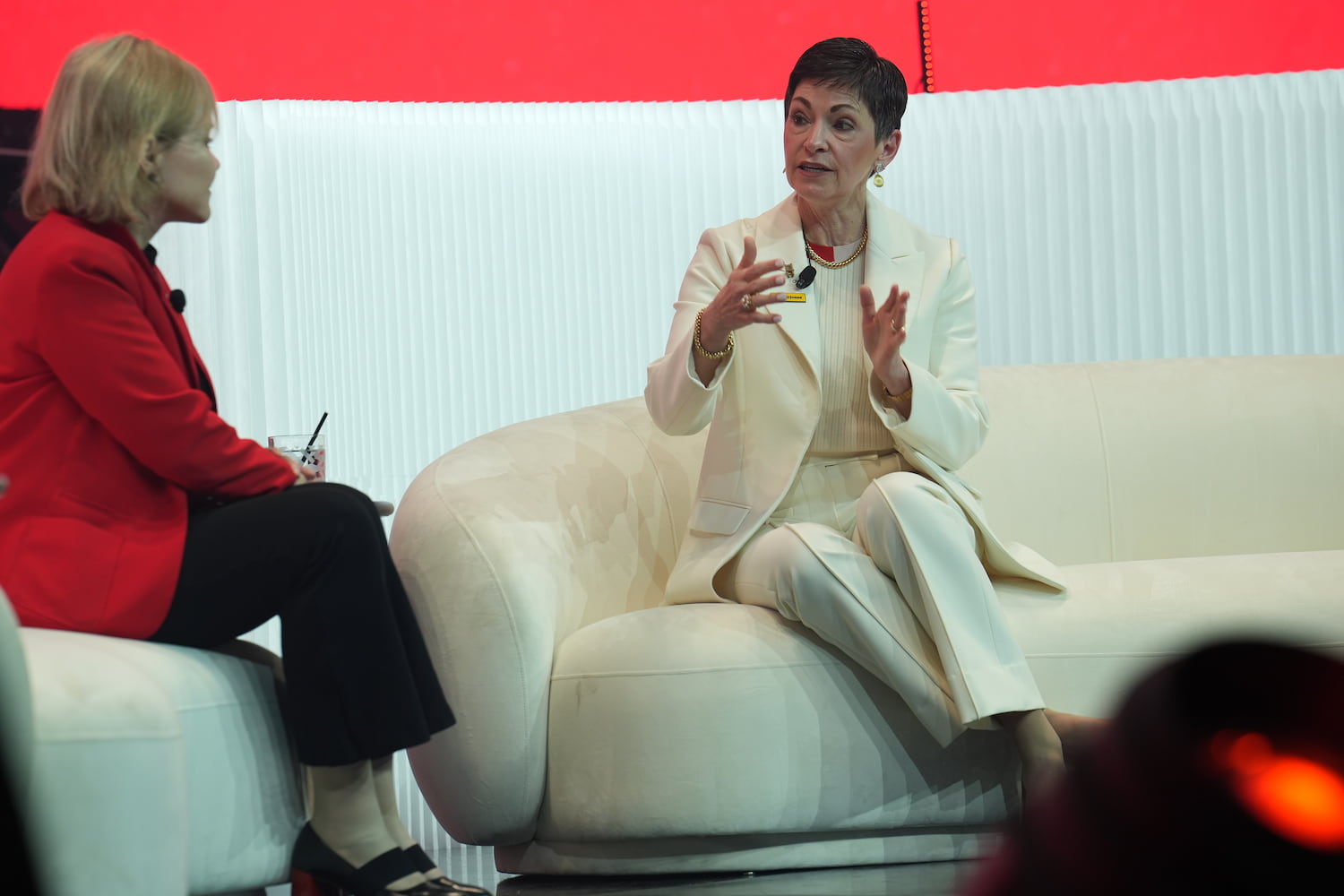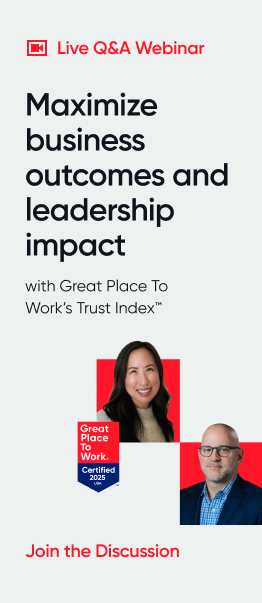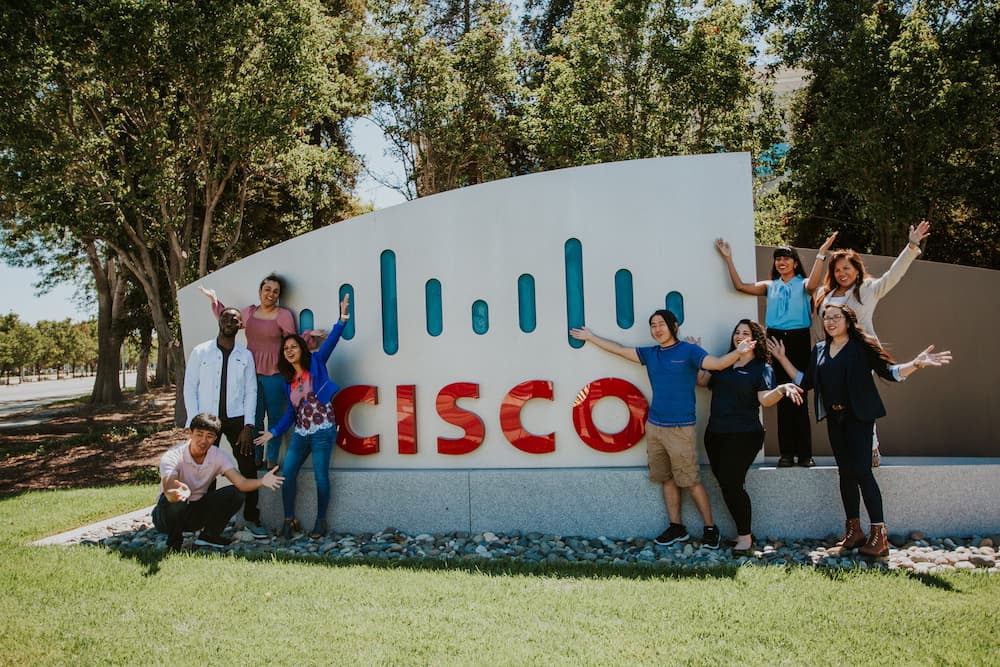Best Workplaces, Employee Experience, Employee Well-being
Employees at winning companies were more likely to report fair pay, well-being, and opportunities for professional development.
As Europe continues to feel the pain of high energy prices and weak growth, the numbers tell a strange story.
Economic output of the 20 countries that use the euro currency dropped in two consecutive quarters, meeting the technical definition of a recession. Yet, labor markets are not falling apart. Unemployment is at its lowest level since 1999.
That means businesses are forced to balance a challenging economy with a hot labor market, and fight to retain their best employees. That’s exactly what the best companies in Europe have done, and investments in employee well-being have led to better retention rates and higher rates of productivity.
At the Best Workplaces in Europe™, 88% of employees report they intend to stay with their company long-term. In a global benchmark survey, only 58% for employees at a typical company planned to stay.

Great Place To Work® analyzed over 1 million survey responses representing the work experiences of over 2.6 million employees to identify the 150 companies on this year’s list. Companies were split into four categories: small (10–49 employees), medium (50–499 employees), large (500+ employees), and multinational (at least 1,000 employees and at least three wins on national lists in Europe).
Winning workplaces received higher survey scores around flexibility, fair pay, and well-being. And when workers reported more consistently positive experiences at work, companies were rewarded with better job performance. At the Best Workplaces in Europe™, 91% of employees believe people give extra effort at their company.
Flexibility and trust
One of the ways companies on the 2023 Best Workplaces in Europe List stand out is by offering flexible work arrangements.
At winning companies, 83% of employees reported special and unique benefits, 18 percentage points higher than at other workplaces participating in this year’s survey.
Both large and small companies on the list invested in their workers by giving them extra time away from the job. Untile, No. 13 in the small category, closes the office for one afternoon each month to give employees free time to pursue personal interests. Cadence, the No. 9 in the multinational company category, introduced Global Recharge holidays to provide employees with 12 days of companywide time off to spend with friends and family.
Some companies embraced hybrid and remote work arrangements to offer more flexibility to employees. Synoptik Sweden AB, No. 41 in the large company category, increased flexibility for its opticians by offering digital eye exams that opticians could administer over Microsoft Teams.
To successfully offer flexible work, winning companies had to develop trusting relationships with employees.
“Whether it’s working from home, coming into the office, or a combination of both, we trust our employees to manage their time and deliver exceptional results,” shares Amdocs Development Ltd., No. 11 in the large category.
When employees feel trusted, they have more faith in their managers. At winning companies, 86% of employees said management does a good job assigning and coordinating people, compared to only 71% of employees at other workplaces surveyed.
At the Best Workplaces in Europe, 91% of employees believe people give extra effort at their company.
Building connection
While European workers value flexibility, they also value in-person time with coworkers.
Distilled, No. 24 in the medium category, goes to great lengths to help team members connect with each other. Group hikes and “stay connected” breakfasts are held monthly. In-person huddles and “Wellness Wednesdays” are held quarterly, with the entire company coming together four times a year for what it calls “Company Days.”
“One of our core values is collaboration and in order to collaborate effectively it’s important to get to know your colleagues, and we believe the best way to do this is in person,” Distilled shares. “Our Company Days usually include team building activities, games, and challenges that encourage collaboration, communication, and bonding among colleagues.”
At the Best Workplaces in Europe, 90% of employees say they look forward to going to work and 93% agree that people at their company are caring.
At Deloitte, No. 19 in the multinational category, 700 practitioners from its businesses meet and compete during a multi-day sporting event called the “Derby.” Employees participate in sports activities including mountain biking, trail running, canoeing and more, with employees preparing for months to be ready for the big event.
The result for Deloitte is a culture of camaraderie and team spirit. “This culture of belonging and pride permeates through our interactions, fuels our motivation, and drives our pursuit of excellence,” Deloitte says.
The data shows camaraderie between colleagues pays off. At the Best Workplaces in Europe, 90% of employees say they look forward to going to work and 93% agree that people at their company are caring. In a 2021 benchmark survey of global employees, only 57% of workers said people at their company are caring.
Promoting well-being
By balancing flexibility and connection, the Best Workplaces in Europe are able to offer higher levels of well-being for their employees.
DHL Express, the No. 1 in the multinational category, uses company events like the DHL EuroCup to foster relationships between employees and promote well-being. The EuroCup brings together 3,000 DHL employees to participate in four days of sports competition and well-being activities, including yoga, sound meditation and kayaking. Employees can hear from inspiring speakers and connect with sponsors like the Premier League football club Manchester United.
The event demonstrates to DHL employees the company’s commitment to well-being and reinforces important company values by bringing employees together to learn and celebrate shared goals.
Some of the Best Workplaces in Europe invest in their people through professional development.
At Easi, No. 3 in the medium category, employees are encouraged to participate in coaching and training from their first day on the job. The company has a strong commitment to develop and promote from within.
Other companies are focused on financial well-being for their people, a need that has been highlighted amid rising inflation and economic anxiety in the region. AbbVie, the No. 2 in the multinational category, expanded financial health resources for its people in 2022 and 2023. Programs offer education about personal finance, tips on using AbbVie’s financial tools, and other resources to provide clarity and support.
The result of these efforts can be measured in multiple ways. At the Best Workplaces, 88% of employees report a psychologically and emotionally healthy workplace, 14 percentage points more than for employees at other workplaces surveyed.
When compared to the global average, the gap is even larger. Only 55% of employees at a typical company reported a psychologically and emotionally healthy workplace, revealing the huge benefit to workers of having their employer on the Best Workplaces in Europe list.
Workers at the best workplaces are more likely to have flexibility, meaningful connections with coworkers, and a healthy work environment. In return, those experiences inspire workers to do great work for their companies.
How to make the list
Think your company deserves special recognition? Get started here to become eligible for next year’s Best Workplaces™ honors.











